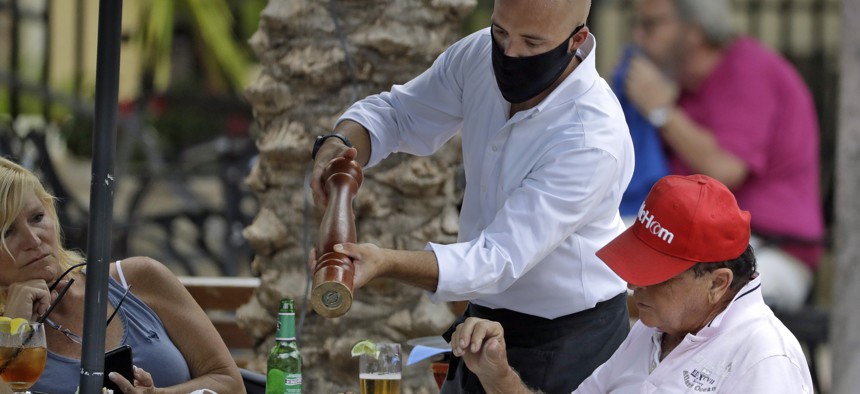Dining Out? Cities Allow Restaurants to Reopen with Seating in Streets, Parking Lots

A food server wearing a protective face mask waits on customers at the Parkshore Grill restaurant Monday, May 4, 2020, in St. Petersburg, Fla. AP Photo/Chris O'Meara
Some states are allowing restaurants to reopen at limited indoor capacity. Cities are letting them have more outdoor seating by closing off streets, sidewalks and parking lots.
Dining al-fresco in the middle of a city street may become the new normal as states begin to loosen coronavirus restrictions and restaurants explore ways to restart dine-in service.
That’s the approach some Florida cities are taking to enable restaurants to seat more patrons, as capacity restrictions will limit indoor seating while states begin to allow restaurants to serve dine-in customers.
Florida Gov. Ron DeSantis implemented phase one of the state’s reopening plan Monday, which allows restaurants to operate at 25% customer capacity indoors. But some restaurant owners say that the capacity cap is too low to make it financially worth it for them to reopen their doors.
To give restaurants additional seating capacity, Tampa will shut down city streets in seven retail zones to allow restaurants to cordon off space to seat patrons outside. Meanwhile, St. Petersburg will allow service in restaurant parking lots and adjacent outdoor sidewalks.
“This will help prevent crowding, allow restaurants to evenly space diners and allow those restaurants to appropriately determine their staffing needs,” said St. Petersburg Mayor Rick Kriseman.
The mayor said he understood that operating at 25% capacity might be a challenge for many restaurants, but was bound by the state’s orders.
“I don’t have the authority to expand that percentage, only to restrict it,” he said. “I have, however, authorized our city development administration to allow restaurants with existing parking lots or other adjacent spaces to expand their outdoor seating areas.”
Under the governor’s orders, Florida restaurants in all but three hard-hit counties can reopen but they must keep tables at least six feet apart. There’s no cap on how many tables restaurants can have outside.
In Tampa, under Mayor Jane Castor’s recovery plan, the city will suspend certain code and permitting regulations to allow restaurants and stores to expand onto sidewalks, parking lots, city parking spaces and some streets to provide more space for diners and shoppers.
“By giving our local business owners as many tools and as much space as possible to safely serve guests, we can work together to protect our workforce, our customers, and our community,” Castor said.
The National Restaurant Association has issued guidelines for restaurants and bars to use when reopening. Recommendations include deep cleaning and sanitizing the entire facility before reopening, checking with employees to ensure they are healthy before returning to work, distancing tables so they are six feet apart from one another, and sanitizing items such as menus and condiments after use by guests.
Even as some states eagerly embark on the first phases of reopening their economies, Americans may not return in droves to restaurants.
Recent polling shows Americans may be hesitant to eat out once restaurants reopen. Only 44% of Americans said they would dine out at a restaurant if social distancing restrictions were lifted tomorrow, according to an ABC News/Ipsos poll.
While many states are looking to lift restrictions so businesses can reopen, some restaurant owners say their concerns about the health and safety of their staff and patrons still outweigh the financial benefits of reopening.
Nashville will allow restaurants to reopen Monday at 50% capacity. But John Stephenson, the owner and chef at Hathorne in West Nashville, told the Tennessean that his high-end restaurant won’t be one of them.
"We don't want to be the canary in the coal mine," he said.
He also highlighted a concern among many in the restaurant industry—the costs associated with opening back up while operating at a limited capacity. About 25 to 30% of Hathorne’s revenue comes from its bar, which will have to remain closed under the city’s reopening ordinance, Stephenson said.
“It doesn’t make sense to hire everybody back to lose money," he said. "I’m not going to reopen until I feel I can at least cover expenses.”
Andrea Noble is a staff correspondent with Route Fifty.
NEXT STORY: What Happened When Health Officials Wanted to Close a Meatpacking Plant, but the Governor Said No





